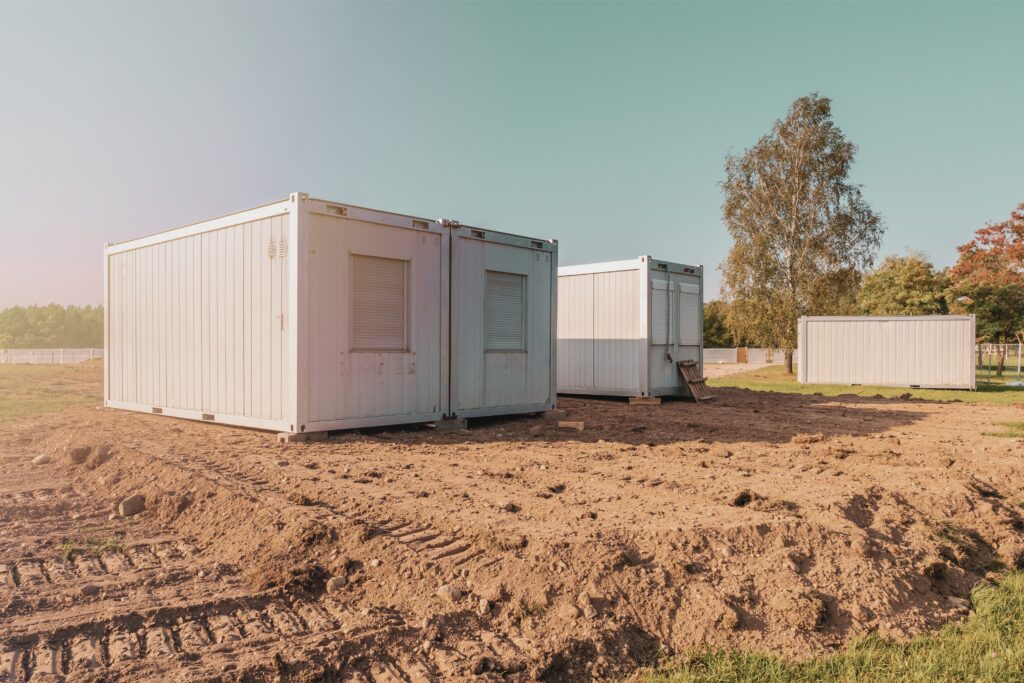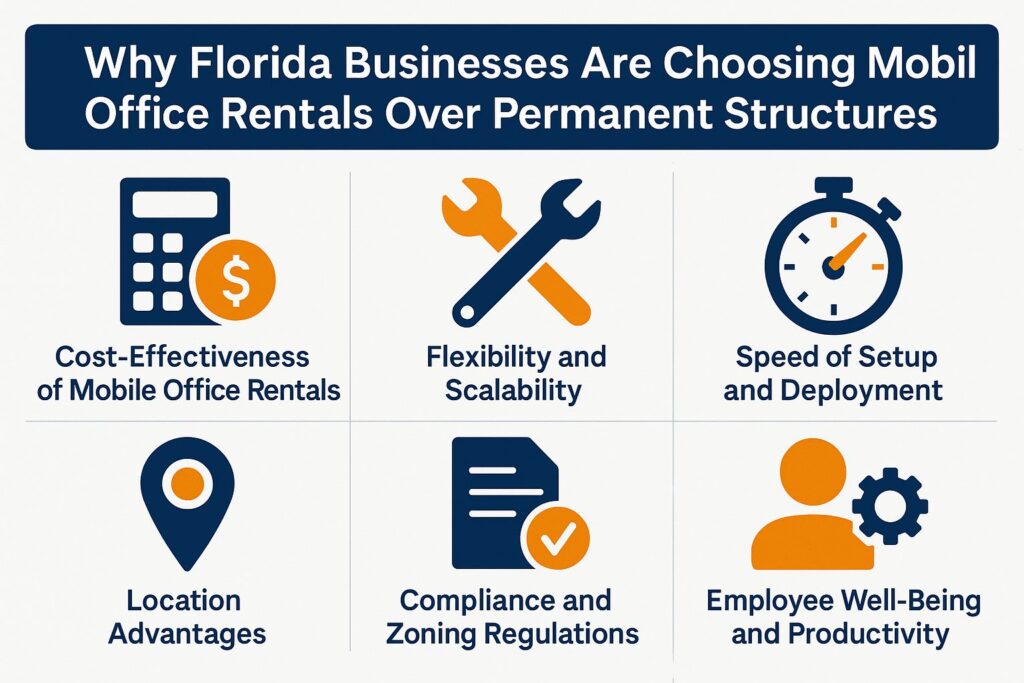
Why Florida Businesses Are Choosing Mobile Office Rentals Over Permanent Structures
Think about changing your flexible workspace to meet your business needs easily. In Florida’s active market, renting mobile offices, using temporary buildings, and finding corporate relocation options are becoming popular choices instead of traditional buildings. With cost savings, flexibility, and quick setup, these innovative solutions cater to businesses of all sizes. Learn how to handle changes, work during different times of the year, and choose effective places while improving worker happiness and dealing with building requirements. Find out why choosing mobile offices could be a great choice for you!
Definition of Mobile Offices
Mobile office rentals offer Florida businesses and beyond a flexible workspace solution that supports workforce mobility and remote work trends.
Mobile offices are temporary workspace solutions that can be relocated and customized to fit the specific needs of businesses, from construction sites to remote project locations.
Common types of mobile offices include:
- Trailers, which are often used on construction sites for onsite meetings and storage;
- Modular units, which can serve as portable classrooms or temporary administrative offices, highlighting modular offices’ advantages;
- Portable containers, ideal for secure storage or as makeshift workspaces.
Each choice offers different levels of flexibility based on what the project needs, considering how the site can be adjusted and how contractors can work. For example, a construction trailer can be equipped with basic features such as heating or air conditioning. Modular units can accommodate multiple office spaces, making them suitable for larger teams.
Overview of Florida’s Business Environment
Florida hosts a wide range of businesses, from large corporations to small startups. The state has favorable tax policies and is strategically located for trade and tourism, making it attractive for business operations. Florida’s economy is diverse, including sectors like tourism, agriculture, and technology. With more people moving in and an expanding job market, the state offers opportunities for new businesses and investment. The business landscape benefits from solid infrastructure and access to a large pool of qualified workers, thanks to the presence of numerous universities and colleges. Florida also benefits from its proximity to Latin America, increasing its role as a trade hub. The state government actively encourages business growth through programs and partnerships to foster a competitive business environment. Overall, Florida provides a supportive setting for businesses seeking to expand and succeed in various industries.
Florida businesses are adjusting to using temporary staff and flexible business approaches.
Florida’s business scene is growing quickly, with over 2.5 million businesses registered. This growth requires flexible solutions like mobile offices to meet the increasing demand.
This diverse environment includes industries such as tourism, agriculture, technology, and healthcare, each requiring unique operational flexibility and workspace customization.
For example, a construction company might use mobile offices to maintain project timelines and reduce extra expenses. Tools like GoToMeeting and Zoom help manage client relations remotely, while products such as Office on Wheels provide customizable workspace options.
This combination helps businesses quickly react to market shifts, promoting steady progress and development in a constantly changing environment.
Cost-Effectiveness of Mobile Office Rentals
Mobile office rentals are a viable alternative to commercial real estate, offering considerable financial advantages.
You can save a lot on expenses with mobile office rentals, which cost between $1,000 and $3,000 each month, compared to traditional office leases that average between $2,500 and $5,000.
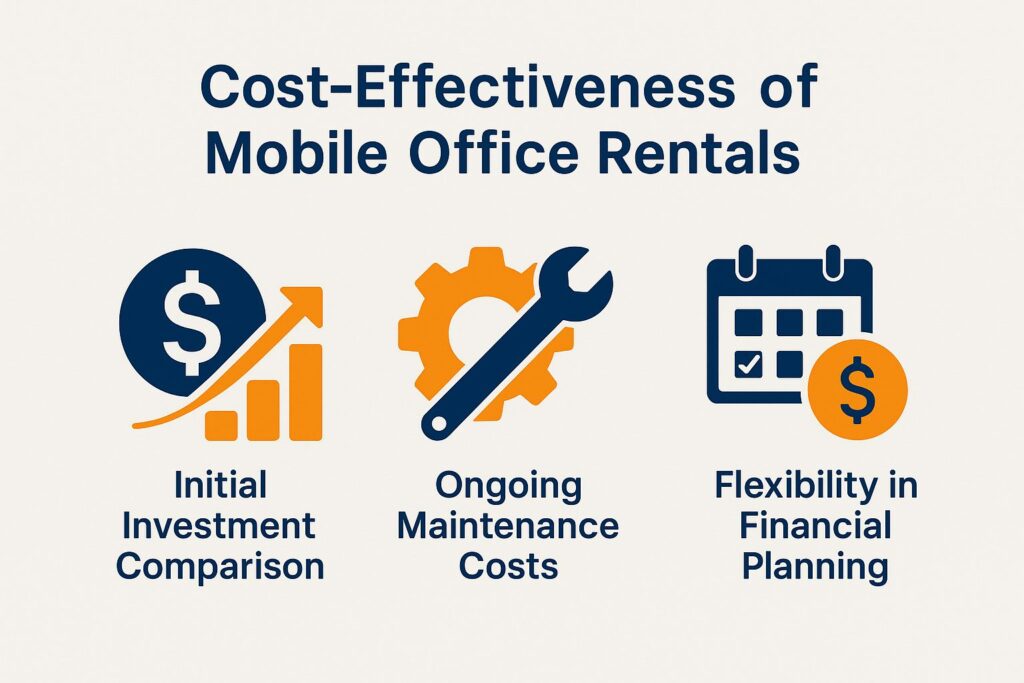
Initial Investment Comparison
Businesses can expect to invest between $5,000 to $15,000 for a mobile office unit depending on size and customization needs, contrasting with $30,000 to $50,000 for permanent structures.
Plus initial costs, businesses should consider recurring expenses. Mobile offices often have lower overhead due to reduced utilities and maintenance costs.
For example, while a traditional office may require ongoing janitorial services and lease payments, mobile units typically incur fewer monthly fees.
Customization for mobile offices is more flexible; businesses can easily add features like solar panels or additional storage, tailoring their workspace as needed for improved workspace optimization and technology integration. Choosing mobile options can save money and improve efficiency over time.
Ongoing Maintenance Costs
Mobile office units boast lower maintenance costs, aiding in economic resilience and business recovery.
Ongoing maintenance for mobile offices typically ranges from $200 to $500 monthly, which is considerably lower than the $1,000 to $2,000 for traditional office spaces.
This price difference comes from a few reasons. Utilities, including electricity and internet, can be significantly cheaper in mobile settings.
For example, an RV office might need only a simple solar system costing about $100 a month, unlike the strong HVAC and internet services needed in a regular office. Repairs and upkeep tend to be more manageable; mobile setups often face fewer wear-and-tear issues than permanent structures.
Doing regular maintenance on your mobile office can help it last longer and save you more money in the long run.
Flexibility in Financial Planning
Mobile office rentals offer lease flexibility, essential for businesses facing commercial leasing challenges.
Mobile office rentals provide businesses with flexible financial planning opportunities, allowing them to adjust their workspace based on project needs without long-term commitments.
This financial option helps businesses handle their cash resources, which is crucial for changes in job patterns and planning ahead. For instance, short-term leases let companies expand or downsize without incurring the penalties of traditional leases.
Many providers, like RentSpace or Instant Offices, offer flexible terms from as little as one month. Lower overhead costs-such as reduced utility bills and maintenance responsibilities-free up funds for other areas.
With these choices, companies can manage their resources more effectively, ensuring they respond promptly to market changes and demand fluctuations.
Flexibility and Scalability
With scalability and location flexibility, mobile offices support startup flexibility and employee collaboration in modern workforce practices.
A key benefit of renting mobile offices is that they can expand operations rapidly, giving companies the flexibility required in the current quick-moving market.
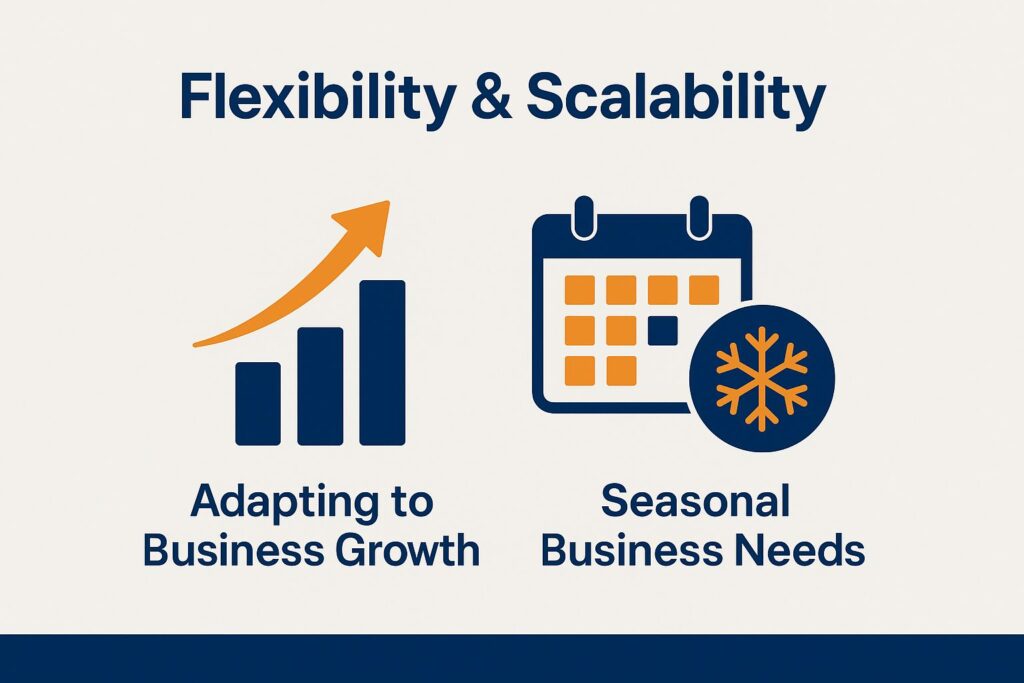
Adapting to Business Growth
Mobile office rentals help businesses adjust and are ideal for companies growing their operations.
Mobile offices can be expanded or reduced in size alongside business growth, with options for multi-unit configurations to accommodate increasing staff or operational needs.
For instance, a tech startup may initially use a single mobile office unit to house its core team of five, integrating remote team management and digital nomadism principles. As the company scales, they can add additional units or modify existing ones to create collaborative spaces, such as conference rooms or break areas.
Tools like Office Trailers offer customizable mobile office solutions, allowing businesses to choose layouts suited to their workflows. A good example is IKEA, which has successfully used mobile solutions during regional growth to make operations more efficient without building permanent infrastructure, demonstrating flexibility in a tough market.
Seasonal Business Needs
Mobile offices are perfect for industries with changing needs because they can be set up for different times of the year.
Companies experiencing seasonal demand fluctuations can easily add or remove mobile office spaces to align their resources with project-based work requirements.
For instance, retail businesses often expand their workforce during the holiday season, necessitating additional workspace close to sales floors.
A construction company might use mobile offices to simplify project logistics for a large contract.
Tools like Mobile Modular and Portable Office Solutions provide flexible options that can be adjusted to meet particular needs, considering site accessibility and local regulations.
Putting mobile units at key locations helps businesses operate better and reduce costs, enabling them to adjust space as seasonal requirements shift.
Speed of Setup and Deployment
Mobile offices are set up quickly, which helps keep businesses running smoothly and lowers costs.
Companies can establish mobile workspaces fast, usually within a day or two, offering quick access to office space when time is important.
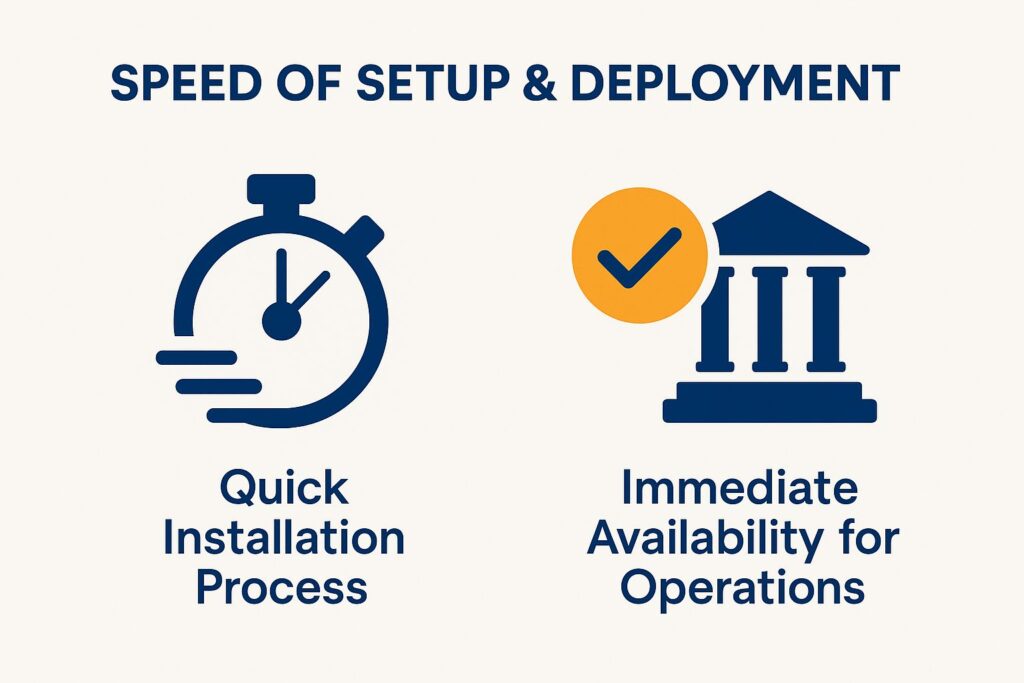
Quick Installation Process
The quick setup process shows how the mobile office contributes to smooth operations and new ideas in the industry.
Mobile offices are usually easy to set up. They often just need to be delivered and connected to utilities, so businesses can begin work quickly.
- To set up a mobile office, begin by coordinating delivery to the desired site, ensuring the area is cleared for easy access.
- Next, connect essential utilities: water, electricity, and internet. This typically requires a licensed technician and can take 1-2 hours.
- After utilities are established, furnish the space according to specific needs, such as adding desks or conference areas, which might take an additional day.
Expect a complete setup timeline of 1-3 days, depending on complexity and additional customization.
Immediate Availability for Operations
Being readily available is essential for smooth operations, especially during business talks and in response to pandemics.
With mobile offices ready for immediate use, businesses can avoid downtime often associated with traditional office setups, ensuring seamless continuity of operations.
This benefit is shown by companies like XYZ Logistics, which set up a mobile office in less than 48 hours after a natural disaster.
With its staff operational and equipped with essential tools like Wi-Fi hotspots and cloud-based software, they met client needs without delays. Using tools such as Zoom for remote meetings and Asana for project management, teams maintained productivity on the go.
By getting rid of setup delays, mobile offices can greatly improve how quickly they respond, leading to better customer satisfaction.
Location Advantages
Benefits of location improve client interaction and employee involvement, offering solutions for city-related challenges. rural offices.
Mobile offices provide location benefits, letting businesses establish their operations where they’re most required, in city areas or distant work sites.
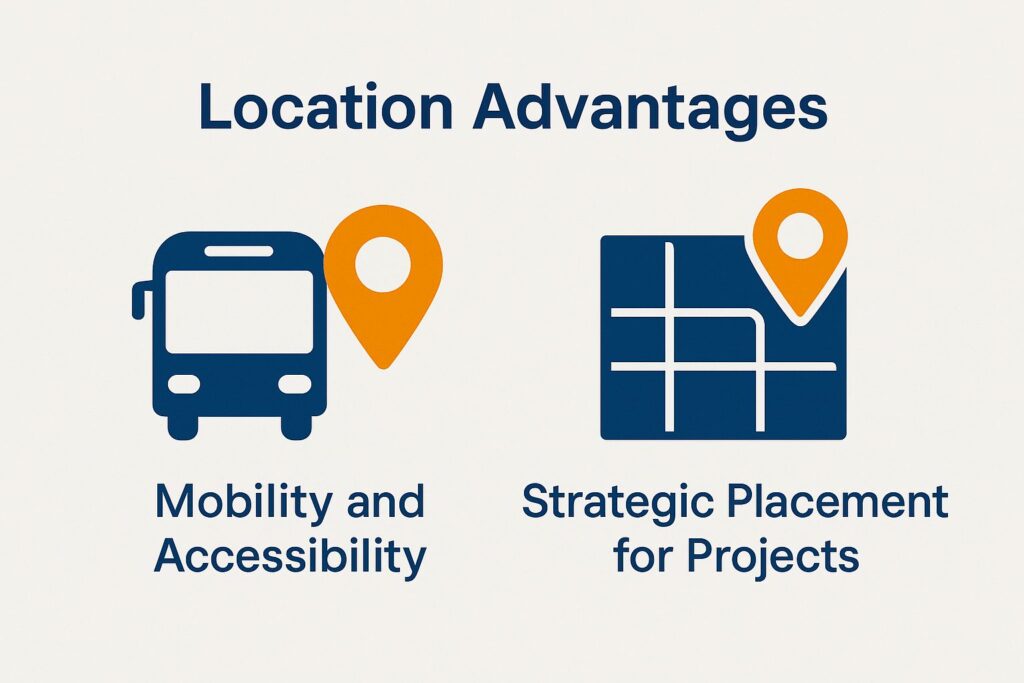
Mobility and Accessibility
Mobility and accessibility are essential, allowing businesses to quickly react to changes in office trends and market needs.
The inherent mobility of mobile offices enables businesses to quickly relocate as project needs change, ensuring accessibility to key markets and clients.
Construction companies often use mobile offices on-site to better manage projects, communicate with contractors, and handle logistics.
A landscaping company could use a portable office with design software to meet clients at their locations, allowing immediate changes and approvals.
Tech startups use vans converted into mobile offices for remote working while attending industry events, capitalizing on networking opportunities and the modern workforce’s flexibility.
Tools like Zoom and Microsoft Teams help people work together online, making it simple to connect with clients or team members, no matter where they are.
Strategic Placement for Projects
Putting mobile offices in the right spots helps with resource distribution and making decisions, which is important for building a professional reputation.
By setting up mobile offices directly at work locations, companies can make processes more efficient and improve teamwork, which leads to better project results.
To maximize impact, consider three critical factors in selecting locations for mobile offices.
- First, assess accessibility; choose sites close to main project areas to reduce travel time.
- Second, look at how people work together; position offices close to important partners or team members to improve communication.
- Check factors like noise levels and weather to create a good work environment.
Placing a mobile office near a construction site enables quick meetings and decisions without stopping work, significantly enhancing project coordination and cutting down construction delays.
Compliance and Zoning Regulations
Knowing compliance and regulatory rules is very important when using mobile offices to make sure they follow local building codes and zoning laws. For those considering a mobile office solution, it’s imperative to explore the specific regulations and options available in Jacksonville, FL to ensure compliance with local standards.
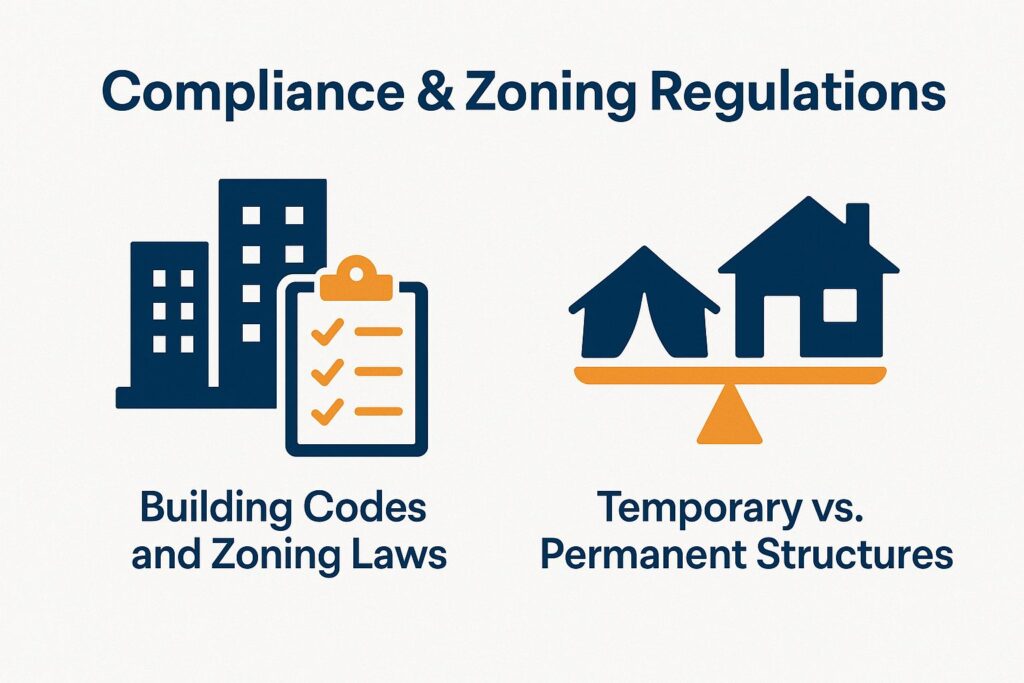
Building Codes and Zoning Laws
Mobile offices in Florida businesses must follow these zoning rules to meet legal requirements.
Each Florida municipality has unique building codes and zoning laws that dictate the use and placement of mobile offices, requiring thorough research before setup, considering local economies and environmental considerations.
To understand these rules properly, start by checking your local zoning office’s website for detailed codes. For instance, Miami-Dade County may require a setback of at least 10 feet from property lines, while Orlando might allow mobile offices only in commercial zones, providing cost-effective solutions for businesses.
Use tools like the American Planning Association’s zoning resources to find relevant codes. Engaging with a local attorney can also provide clarity on compliance, preventing costly fines and ensuring health and safety compliance.
Make sure to get the required permits before you start installing to avoid any problems.
Temporary vs. Permanent Structures
Though mobile offices are considered temporary, knowing how their regulations differ from those for permanent buildings is key for following the rules.
Temporary mobile offices generally require less stringent zoning and permitting compared to permanent buildings, but they must still adhere to local building codes.
For example, contact your local planning department to verify adherence to set-back rules and utility connections.
Consider the duration of occupancy; many jurisdictions stipulate that temporary structures must be removed or converted to permanent status within a specified timeframe.
Using tools like zoning maps or services that focus on local rules can make following regulations easier.
Employee Well-Being and Productivity
Mobile office rentals can improve employee comfort and work efficiency by offering workspaces that can be adjusted to meet the unique needs of each team. This increases productivity and supports staff.
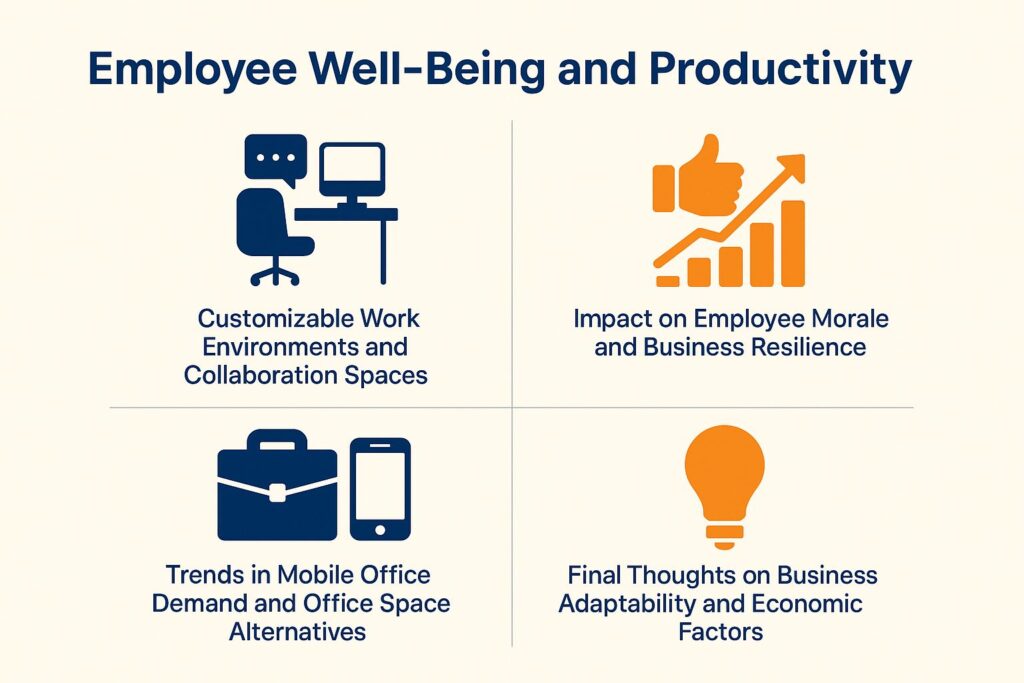
Customizable Work Environments and Collaboration Spaces
Mobile offices can be customized with ergonomic furniture, technology integration, and layout alterations to suit the preferences of employees and teams, providing commuter-friendly options and collaboration spaces.
- For ergonomic furniture, consider height-adjustable desks like Varidesk or standing desk converters.
- Use technology by supplying portable chargers, Wi-Fi hotspots, and dual monitors for better connectivity.
- Rearranging the layout to include breakout zones or quiet spaces encourages collaboration and focus.
- For example, use portable partitions to create small meeting areas or quiet nooks, allowing employees to choose environments that best suit their tasks.
- Making these changes creates a workspace that is more comfortable and productive, meeting each person’s specific needs.
Impact on Employee Morale and Business Resilience
Research shows that clean and well-organized mobile work areas can increase employee happiness by 30%, resulting in higher job satisfaction and better teamwork.
Companies like Google and WeWork have introduced mobile office layouts with adjustable work areas, resulting in noticeable improvements in team interactions, enhancing workplace trends.
For example, a survey from WeWork found that 82% of employees reported feeling more engaged in collaborative activities using their mobile office environment.
Offering amenities like lounge areas and quiet pods facilitates creativity and reduces stress. Using technology for remote work gives employees more flexibility, which improves their morale and supports service-based industries.
These strategies create a good environment and can result in higher productivity and better employee retention, contributing to market competition.
Trends in Mobile Office Demand and Office Space Alternatives
Recent studies show that the mobile office market is projected to grow by 15% annually as more companies recognize the efficiency and flexibility they offer, addressing project-based needs and startup costs.
This growth is driven largely by the rise in remote work arrangements, with 70% of organizations adopting hybrid models according to recent surveys.
Businesses are spending money on mobile office tools such as portable desks, foldable chairs, and high-speed internet hotspots to improve work efficiency and reduce overhead costs.
Tools such as Slack and Zoom are also gaining traction for seamless collaboration. Companies like WeWork are creating flexible workspace plans that serve teams looking for short-term office solutions, increasing interest in the market and providing job site offices.
Final Thoughts on Business Flexibility and Economic Factors
To stay competitive, businesses need to use mobile office tools in their operations so they can quickly respond to market changes and gain tax benefits.
Mobile offices, such as modular buildings and converted shipping containers, provide flexible workspaces that can be set up quickly and are convenient for onsite offices.
For example, a company might use OfficePOD, which sells modular offices starting at $17,000. Alternatively, businesses like WeWork provide coworking spaces that can be rented by the day or month, catering to short-term needs and offering office equipment rental options.
Using mobile apps like Trello or Slack helps teams work together while on the move. By using these solutions together, businesses can continue to work effectively while reducing costs, ensuring business resilience, and meeting new market demands.
About the Author
I’m John Keller, a University of Florida graduate with a bachelor’s degree in Business Management and the owner of Florida Used Construction Trailers. With over 12 years of experience in the industry, I’ve helped hundreds of Florida contractors—from Miami to Tampa—get the reliable jobsite offices they need to stay productive and profitable.

